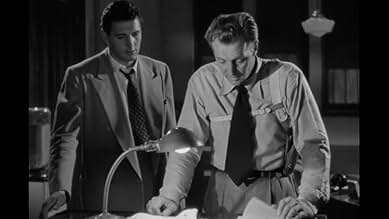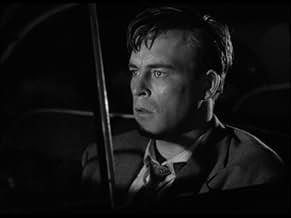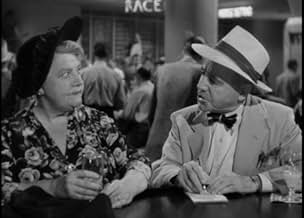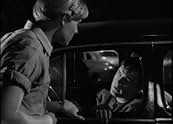IMDb RATING
6.6/10
1.1K
YOUR RATING
A paroled convict is framed for murder and must clear himself before the police catch him.A paroled convict is framed for murder and must clear himself before the police catch him.A paroled convict is framed for murder and must clear himself before the police catch him.
Dan Ferniel
- Gene
- (as Daniel Ferniel)
Rock Hudson
- Detective
- (as Roc Hudson)
Anne P. Kramer
- Telegraph Clerk
- (as Ann Pearce)
Bobby Barber
- Tony
- (uncredited)
Marjorie Bennett
- Wife at Reno Bar
- (uncredited)
Edward Clark
- Drugstore Clerk
- (uncredited)
James Conaty
- Gambler
- (uncredited)
Sayre Dearing
- Gambler
- (uncredited)
Robert Easton
- Fisher - Parking Lot Valet
- (uncredited)
George Eldredge
- Pop
- (uncredited)
- Director
- Writers
- All cast & crew
- Production, box office & more at IMDbPro
6.61K
1
2
3
4
5
6
7
8
9
10
Featured reviews
Not bad for a B thriller, actually vying with the best ones
The plot is actually impressingly ingenious, as it is impossible to guess what it is all about, and like the poor framed victim and failed wooer you feel inclined to just give it all up, but there are two dames involved in this, one in the thick of it and one by accident. Eventually the one with the many children carries home the prize.
The music adds to the increasing quality of this very suggestive noir, and several composers appear to have been at it, among others Frank Skinner and Miklos Rosza. William Castle directed many films, mostly B, the "Whistler" series and the "Crime Doctor" series among others, but this should be one of the best ones. For once the brevity of the film is an asset, because it increases the density and the brilliant conciseness of the account. The plot is brilliantly contrived, like a perfect jig-saw puzzle, which is impossible to identify before it is finished, as the clue to the mystery arrives better late than never. The actors make good performances, Scott Brady on the rack at the mercy of Dorothy Hart, while Peggy Dow is a relief. You get misgivings from the beginning as it is in the racket of gambling, starting off at Reno and continuing in Chicago with hoodlums and everything, and all your worst suspicions gradually come true. But it is an efficient thriller and well worth watching, for all its extreme unpleasantness of worries and suspense.
The music adds to the increasing quality of this very suggestive noir, and several composers appear to have been at it, among others Frank Skinner and Miklos Rosza. William Castle directed many films, mostly B, the "Whistler" series and the "Crime Doctor" series among others, but this should be one of the best ones. For once the brevity of the film is an asset, because it increases the density and the brilliant conciseness of the account. The plot is brilliantly contrived, like a perfect jig-saw puzzle, which is impossible to identify before it is finished, as the clue to the mystery arrives better late than never. The actors make good performances, Scott Brady on the rack at the mercy of Dorothy Hart, while Peggy Dow is a relief. You get misgivings from the beginning as it is in the racket of gambling, starting off at Reno and continuing in Chicago with hoodlums and everything, and all your worst suspicions gradually come true. But it is an efficient thriller and well worth watching, for all its extreme unpleasantness of worries and suspense.
William Castle Directs a Good Murder Mystery
Scott Brady meets Peggy Dow at the Reno gambling spot run by John Russell. He helps her win $120 at the craps table. They are seated next to each other on the flight to Chicago. He tells her he's going to propose to Dorothy Hart. He doesn't notice, but she looks disappointed.
In Chicago, Miss Hart is enthusiastic, but she warns him her uncle will object. He's the head of the Syndicate and he doesn't want her wedding anyone from the criminal world. Brady says he'll talk to him, but on the way he is grabbed, shot and moved. When he wakes, he discovers her uncle has been killed and he's been identified as the killer. The cops are on to his old friends. His only possible help is Miss Dow and his old friend Bruce Bennett, now a Chicago detective.
William Castle directed this with a lot of Chicago location shooting. It's more a Black Mask sort of story than a straight noir, with the lighting touches limited to the El system and the final couple of minutes. The movie is directed for speed and efficiency -- a Universal programmer, but with a decent number of red herrings and good performances (particularly by Bennett) until the murk begins to clear for the viewer about two-thirds of the way through.
Observant fans will want to keep an eye out for Rock Hudson in his first credited role.
In Chicago, Miss Hart is enthusiastic, but she warns him her uncle will object. He's the head of the Syndicate and he doesn't want her wedding anyone from the criminal world. Brady says he'll talk to him, but on the way he is grabbed, shot and moved. When he wakes, he discovers her uncle has been killed and he's been identified as the killer. The cops are on to his old friends. His only possible help is Miss Dow and his old friend Bruce Bennett, now a Chicago detective.
William Castle directed this with a lot of Chicago location shooting. It's more a Black Mask sort of story than a straight noir, with the lighting touches limited to the El system and the final couple of minutes. The movie is directed for speed and efficiency -- a Universal programmer, but with a decent number of red herrings and good performances (particularly by Bennett) until the murk begins to clear for the viewer about two-thirds of the way through.
Observant fans will want to keep an eye out for Rock Hudson in his first credited role.
A house with a long corridor
Today ,William Castle is known as the man who bought Ira Levin's "Rosemary's baby " rights and produced one of the best horror movies of all time.
"Undertow" has a quite derivative screenplay but the director made the best of it and any film noir buff can give it a chance :it thoroughly deserves it.It features at least one unforgettable scene: the chase in the long corridor which gives you goose flesh.Of the two female leads,I prefer Dorothy Hart to the rather bland Peggy Dow.
In the 1968 movie Castle produced ,there was a corridor which played a prominent part too.
"Undertow" has a quite derivative screenplay but the director made the best of it and any film noir buff can give it a chance :it thoroughly deserves it.It features at least one unforgettable scene: the chase in the long corridor which gives you goose flesh.Of the two female leads,I prefer Dorothy Hart to the rather bland Peggy Dow.
In the 1968 movie Castle produced ,there was a corridor which played a prominent part too.
William Castle directs this dandy little noir thriller.
Tony (Scott Brady) is the perfect patsy. He's an ex-con and the Chicago police are more than willing to believe the worst of him. So, when some unknown people kidnap him, shoot him and set him up for his future father-in-law's murder, the case seems pretty air-tight. However, like so many noir films, he investigates the case himself and aims to prove his innocence. Along the way, he gets the help from a nice lady and even from a cop.
"Undertow" is an excellent and enjoyable film. While Peggy Dow's character makes no sense (why would anyone help a wanted man when they barely know them?!), the overall story is quite well made and keeps your attention. It has some excellent twists and the acting is quite good despite the actors mostly being second-tier. It sure helped having the excellent director William Castle in charge, as he had a habit of making the most of lower budgets.
"Undertow" is an excellent and enjoyable film. While Peggy Dow's character makes no sense (why would anyone help a wanted man when they barely know them?!), the overall story is quite well made and keeps your attention. It has some excellent twists and the acting is quite good despite the actors mostly being second-tier. It sure helped having the excellent director William Castle in charge, as he had a habit of making the most of lower budgets.
A very nice surprise
Having returned to Chicago, Tony Reagan (Scott Brady) is accused of murdering a wealthy, powerful man who happens to be his fiance's uncle. Injured and with the police hot on his trail, Reagan has few places to turn. He eventually seeks the assistance of a woman he hardly knows. He met her the previous day on the flight to Chicago. With her help, Reagan's out to clear his name.
Undertow is a neat little film noir that, until last night, I had never heard of. I was shocked at how much I enjoyed it. The story has a lot of suspense that builds throughout. There may have been a few predictable bits in the plot (like the murderer's ID) and some big coincidences (like a friendly cop who agrees to help), but the journey is so much fun it hardly mattered. Director William Castle (yes, that William Castle) proves that he could do more than churn out sensational schlock. His pacing in Undertow is about perfect. The film also looks phenomenal. Cinematographer Irving Glassberg lensed a movie that looks far better than it has a right to. But, then again, I seem to say that about a lot of the Universal B picture output from the 40s. Finally, I enjoyed the exterior 40s-era footage. Whether it was the airport, the plane, or downtown Chicago, it was awesome stuff.
I have no complaints as far as the acting goes. Generally, I'm not much of a fan of Scott Brady. There's just something about him that puts me off. Here, however, I thought his performance was more than adequate. As for co-star Peggy Dow - what a revelation! Considering this was her first film role, she was amazing. Dow plays the sweet, innocent, cute, trusting, fresh-faced, all-American girl about as well as anyone I've ever seen. Looking over her filmography, I'm saddened to see she only made nine films. I'm going to make it my mission to see as many of these as I can. The rest of the supporting cast - John Russell, Dorothy Hart, Bruce Bennett - are equally strong. Finally, the film features a blink-and-you'll-miss-it moment from a fresh-faced Roc (with no k) Hudson.
Overall, a nice little film that I'm happy to have stumbled upon. Undertow gives me hope as I continue my journey through some of these smaller, lesser known film noirs.
7/10.
Undertow is a neat little film noir that, until last night, I had never heard of. I was shocked at how much I enjoyed it. The story has a lot of suspense that builds throughout. There may have been a few predictable bits in the plot (like the murderer's ID) and some big coincidences (like a friendly cop who agrees to help), but the journey is so much fun it hardly mattered. Director William Castle (yes, that William Castle) proves that he could do more than churn out sensational schlock. His pacing in Undertow is about perfect. The film also looks phenomenal. Cinematographer Irving Glassberg lensed a movie that looks far better than it has a right to. But, then again, I seem to say that about a lot of the Universal B picture output from the 40s. Finally, I enjoyed the exterior 40s-era footage. Whether it was the airport, the plane, or downtown Chicago, it was awesome stuff.
I have no complaints as far as the acting goes. Generally, I'm not much of a fan of Scott Brady. There's just something about him that puts me off. Here, however, I thought his performance was more than adequate. As for co-star Peggy Dow - what a revelation! Considering this was her first film role, she was amazing. Dow plays the sweet, innocent, cute, trusting, fresh-faced, all-American girl about as well as anyone I've ever seen. Looking over her filmography, I'm saddened to see she only made nine films. I'm going to make it my mission to see as many of these as I can. The rest of the supporting cast - John Russell, Dorothy Hart, Bruce Bennett - are equally strong. Finally, the film features a blink-and-you'll-miss-it moment from a fresh-faced Roc (with no k) Hudson.
Overall, a nice little film that I'm happy to have stumbled upon. Undertow gives me hope as I continue my journey through some of these smaller, lesser known film noirs.
7/10.
Did you know
- TriviaLarge speaking role for Gene (Dan Ferniel), the black chauffeur. There is also a black butler with more than just a few lines. A few black people can be seen in the background in some of the crowd scenes walking down the street in Chicago.
- GoofsWhen Ann McKnight is throwing the dice at the roulette table, her purse changes orientation from cut to cut. It starts with her holding it under her arms then it is resting on the roulette table and then it is under her arms again.
- How long is Undertow?Powered by Alexa
Details
- Runtime
- 1h 11m(71 min)
- Color
- Aspect ratio
- 1.37 : 1
Contribute to this page
Suggest an edit or add missing content






































